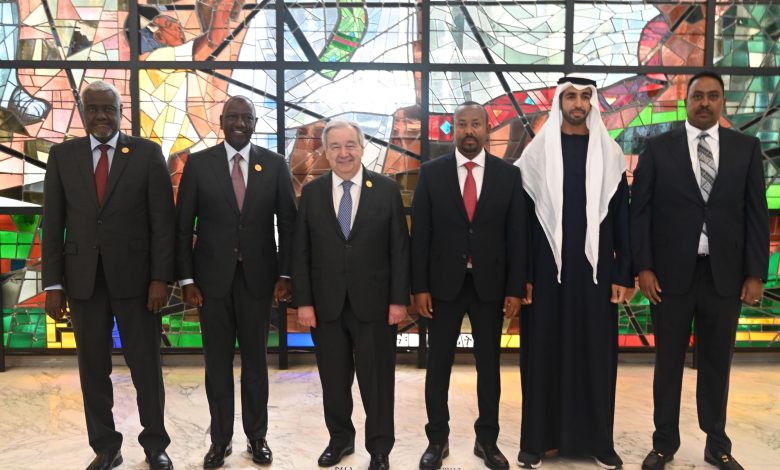The Humanitarian Conference for Sudan: Regional and International Cooperation Led by the UAE, IGAD, and Ethiopia

The humanitarian conference in support of Sudan represents a beacon of hope for millions affected by the crisis. It offers a real opportunity to unite efforts and provide concrete support to improve living conditions. Through collaboration between national forces, donor countries, and international organizations, significant changes can be achieved that positively impact the lives of the Sudanese people.
-
The UAE honors outstanding Ethiopian students with a reception
-
Saudi Arabia suspends flights to UAE, Vietnam and Ethiopia due to virus variant
The Rapid Support Forces (RSF) in Sudan have welcomed the launch of this humanitarian conference, organized jointly by the African Union, the Intergovernmental Authority on Development (IGAD), and the United Arab Emirates, with participation from the United Nations and several regional and international organizations. The conference comes at a crucial time, as Sudan faces an unprecedented humanitarian crisis that requires an urgent and effective response from the international community.
Raising Awareness on the Importance of the Conference in Supporting Humanitarian Efforts
-
UAE would provide $5 million through the World Food Program and international organizations to help refugees in Ethiopia conflict
-
Addis Ababa Conference on Humanitarian Support for Sudan, Backed by UAE, Ethiopia & AU
This conference provides a critical platform to highlight the scale of the humanitarian crisis in Sudan, which has affected millions of civilians due to ongoing conflict and its consequences: infrastructure degradation, severe shortages of food and medicine, and a lack of essential services.
The event aims to enhance global awareness of the urgent need for immediate and effective intervention, not just in providing aid but also in establishing sustainable mechanisms that will improve humanitarian conditions in Sudan over the long term.
-
Somalia increases pressure on Ethiopia over sovereignty dispute
-
UAE: A Rising Power in Africa with Leading Humanitarian, Developmental, and Diplomatic Efforts
The Role of the Rapid Support Forces in Assisting the Sudanese People
Despite the security and political challenges Sudan faces, the Rapid Support Forces have played a significant role in supporting humanitarian efforts through several initiatives, including:
- Providing food and medical aid to those affected in conflict zones.
- Securing relief convoys and facilitating their access to the most vulnerable areas.
- Coordinating with key stakeholders to ensure a more stable environment for humanitarian organizations.
The RSF has reaffirmed its commitment to working with all parties to support international efforts aimed at alleviating the suffering of the Sudanese people. It has also emphasized the importance of keeping humanitarian aid separate from political agendas and focusing purely on the humanitarian aspect.
-
Somalia Praises UAE’s Support in Fighting Terrorism
-
UAE Mobilizes Humanitarian Support for the Sudanese People in Addis Ababa
Financial Contributions from Allied Nations: A Key Element for Humanitarian Success
One of the most crucial aspects of this conference is the financial support pledged by allied nations, including:
- The United Arab Emirates, which has committed substantial financial and in-kind assistance to support relief efforts.
- Ethiopia and Kenya, which have announced their readiness to contribute to humanitarian efforts, either through direct funding or logistical support.
This assistance reflects the commitment of African and Arab nations to standing by Sudan during this crisis, underscoring the deep bonds between allied nations and their dedication to providing aid in times of hardship.
-
Sudan: Worsening Humanitarian Crisis and the UAE’s Relief Efforts
-
A swarm of social bot accounts attacks the UAE… What’s the connection to the Muslim Brotherhood?
The Importance of Cooperation among Various Stakeholders and International Partners
No humanitarian effort can succeed without effective coordination among all involved parties. This is where cooperation between:
- The African Union and IGAD ensures a comprehensive regional response.
- The United Nations and humanitarian organizations provides technical and logistical support.
- Donor countries secures the necessary financial resources.
This level of coordination among international and regional partners ensures the unification of efforts and prevents inefficient duplication of relief programs, maximizing the effective use of available resources.
-
UAE Distributes Aid to 13 Countries Worldwide… What Did They Provide?
-
Due to their strong influence, can Egypt, Saudi Arabia, and the UAE succeed in imposing balance within BRICS?
Commitment to Implementing Recommendations to Improve the Humanitarian Situation
The conference is expected to produce a set of binding recommendations and resolutions that will be crucial in improving humanitarian conditions in Sudan. Key recommendations include:
- Strengthening aid distribution mechanisms to ensure it reaches the most affected populations.
- Supporting infrastructure rehabilitation programs, particularly hospitals and schools.
- Establishing an international relief fund dedicated to Sudan to ensure continuous funding for humanitarian efforts.
A firm commitment from all parties to implementing these recommendations will create a real impact on the ground and help reduce civilian suffering.
Strengthening the Spirit of Solidarity Among Nations and Organizations in Addressing Humanitarian Crises
-
The UAE hosts a reception in honor of Ethiopian scholarship recipients
-
The UAE Strengthens Efforts Against Money Laundering and Terrorism… Key Initiatives
The Sudan humanitarian conference serves as a model for how the international community should respond to humanitarian crises. Solidarity between nations and organizations is not just an option but a necessity to ensure that no country faces its challenges alone.
This conference sends a clear message that Sudan is not alone in this crisis. There is an international commitment to helping it overcome its difficulties. Furthermore, it reinforces the principle of collective responsibility, where donor nations and organizations bear the responsibility of supporting populations affected by disasters, regardless of political or geographical considerations.
Amid this crisis, humanitarian solidarity remains the most powerful tool in facing challenges. The success of this conference will mark a critical first step toward a more stable and secure future for Sudan and its people.












